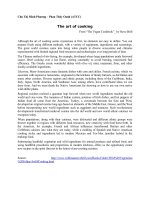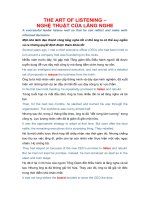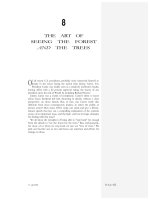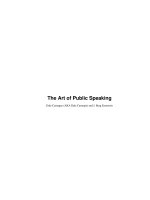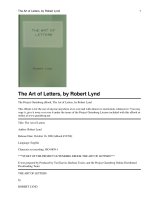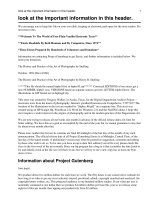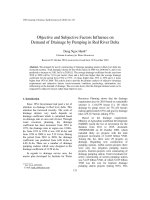The Essays Of Arthur Schopenhauerby The Art Of Literature By T. Baiiey Saunders, Arthur Schopenhauer pot
Bạn đang xem bản rút gọn của tài liệu. Xem và tải ngay bản đầy đủ của tài liệu tại đây (428.11 KB, 94 trang )
The Essays of
Arthur Schopenhauer:
The Art of Literature
Arthur Schopenhauer
Translated by T. BaiIey Saunders
THE ESSAYS
OF
ARTHUR SCHOPENHAUER
TRANSLATED BY
T. BAILEY SAUNDERS, M.A.
THE ART OF LITERATURE.
CONTENTS.
PREFACE
ON AUTHORSHIP
ON STYLE
ON THE STUDY OF LATIN
ON MEN OF LEARNING
ON THINKING FOR ONESELF
ON CRITICISM
ON REPUTATION
ON GENIUS
TRANSLATOR’S PREFACE.
The contents of this, as of the other volumes in the series, have been
drawn from Schopenhauer’s Parerga, and amongst the various
subjects dealt with in that famous collection of essays, Literature
holds an important place. Nor can Schopenhauer’s opinions fail to be
of special value when he treats of literary form and method. For,
quite apart from his philosophical pretensions, he claims recognition
as a great writer; he is, indeed, one of the best of the few really
excellent prose-writers of whom Germany can boast. While he is
thus particularly qualified to speak of Literature as an Art, he has
also something to say upon those influences which, outside of his
own merits, contribute so much to an author’s success, and are so
often undervalued when he obtains immediate popularity.
Schopenhauer’s own sore experiences in the matter of reputation
lend an interest to his remarks upon that subject, although it is too
much to ask of human nature that he should approach it in any
dispassionate spirit.
In the following pages we have observations upon style by one who
was a stylist in the best sense of the word, not affected, nor yet a
phrasemonger; on thinking for oneself by a philosopher who never
did anything else; on criticism by a writer who suffered much from
the inability of others to understand him; on reputation by a
candidate who, during the greater part of his life, deserved without
obtaining it; and on genius by one who was incontestably of the
privileged order himself. And whatever may be thought of some of
his opinions on matters of detail—on anonymity, for instance, or on
the question whether good work is never done for money—there can
be no doubt that his general view of literature, and the conditions
under which it flourishes, is perfectly sound.
It might be thought, perhaps, that remarks which were meant to
apply to the German language would have but little bearing upon
one so different from it as English. This would be a just objection if
Schopenhauer treated literature in a petty spirit, and confined
himself to pedantic inquiries into matters of grammar and
etymology, or mere niceties of phrase. But this is not so. He deals
with his subject broadly, and takes large and general views; nor can
anyone who knows anything of the philosopher suppose this to
mean that he is vague and feeble. It is true that now and again in the
course of these essays he makes remarks which are obviously meant
to apply to the failings of certain writers of his own age and country;
but in such a case I have generally given his sentences a turn, which,
while keeping them faithful to the spirit of the original, secures for
them a less restricted range, and makes Schopenhauer a critic of
similar faults in whatever age or country they may appear. This has
been done in spite of a sharp word on page seventeen of this volume,
addressed to translators who dare to revise their author; but the
change is one with which not even Schopenhauer could quarrel.
It is thus a significant fact—a testimony to the depth of his insight
and, in the main, the justice of his opinions—that views of literature
which appealed to his own immediate contemporaries, should be
found to hold good elsewhere and at a distance of fifty years. It
means that what he had to say was worth saying; and since it is
adapted thus equally to diverse times and audiences, it is probably
of permanent interest.
The intelligent reader will observe that much of the charm of
Schopenhauer’s writing comes from its strongly personal character,
and that here he has to do, not with a mere maker of books, but with
a man who thinks for himself and has no false scruples in putting his
meaning plainly upon the page, or in unmasking sham wherever he
finds it. This is nowhere so true as when he deals with literature; and
just as in his treatment of life, he is no flatterer to men in general, so
here he is free and outspoken on the peculiar failings of authors. At
the same time he gives them good advice. He is particularly happy
in recommending restraint in regard to reading the works of others,
and the cultivation of independent thought; and herein he recalls a
saying attributed to Hobbes, who was not less distinguished as a
writer than as a philosopher, to the effect that “if he had read as much
as other men, he should have been as ignorant as they. ”
Schopenhauer also utters a warning, which we shall do well to take
to heart in these days, against mingling the pursuit of literature with
vulgar aims. If we follow him here, we shall carefully distinguish
between literature as an object of life and literature as a means of
living, between the real love of truth and beauty, and that detestable
false love which looks to the price it will fetch in the market. I am not
referring to those who, while they follow a useful and honorable
calling in bringing literature before the public, are content to be
known as men of business. If, by the help of some second witch of
Endor, we could raise the ghost of Schopenhauer, it would be
interesting to hear his opinion of a certain kind of literary enterprise
which has come into vogue since his day, and now receives an
amount of attention very much beyond its due. We may hazard a
guess at the direction his opinion would take. He would doubtless
show us how this enterprise, which is carried on by self-styled
literary men, ends by making literature into a form of merchandise,
and treating it as though it were so much goods to be bought and
sold at a profit, and most likely to produce quick returns if the
maker’s name is well known. Nor would it be the ghost of the real
Schopenhauer unless we heard a vigorous denunciation of men who
claim a connection with literature by a servile flattery of successful
living authors—the dead cannot be made to pay—in the hope of
appearing to advantage in their reflected light and turning that
advantage into money.
In order to present the contents of this book in a convenient form, I
have not scrupled to make an arrangement with the chapters
somewhat different from that which exists in the original; so that two
or more subjects which are there dealt with successively in one and
the same chapter, here stand by themselves. In consequence of this,
some of the titles of the sections are not to be found in the original. I
may state, however, that the essays on Authorship and Style and the
latter part of that on Criticism are taken direct from the chapter
headed Ueber Schriftstellerei und Stil; and that the remainder of the
essay on Criticism, with that of Reputation, is supplied by the remarks
Ueber Urtheil, Kritik, Beifall und Ruhm. The essays on The Study of
Latin, on Men of Learning, and on Some Forms of Literature, are taken
chiefly from the four sections Ueber Gelehrsamkeit und Gelehrte, Ueber
Sprache und Worte, Ueber Lesen und Bücher: Anhang, and Zur
Metaphysik des Schönen. The essay on Thinking for Oneself is a
rendering of certain remarks under the heading Selbstdenken. Genius
was a favorite subject of speculation with Schopenhauer, and he
often touches upon it in the course of his works; always, however, to
put forth the same theory in regard to it as may be found in the
concluding section of this volume. Though the essay has little or
nothing to do with literary method, the subject of which it treats is
the most needful element of success in literature; and I have
introduced it on that ground. It forms part of a chapter in the Parerga
entitled Den Intellekt überhaupt und in jeder Beziehung betreffende
Gedanken: Anhang verwandter Stellen.
It has also been part of my duty to invent a title for this volume; and
I am well aware that objection may be made to the one I have
chosen, on the ground that in common language it is unusual to
speak of literature as an art, and that to do so is unduly to narrow its
meaning and to leave out of sight its main function as the record of
thought. But there is no reason why the word Literature should not
be employed in that double sense which is allowed to attach to
Painting, Music, Sculpture, as signifying either the objective outcome
of a certain mental activity, seeking to express itself in outward form;
or else the particular kind of mental activity in question, and the
methods it follows. And we do, in fact, use it in this latter sense,
when we say of a writer that he pursues literature as a calling. If,
then, literature can be taken to mean a process as well as a result of
mental activity, there can be no error in speaking of it as Art. I use
that term in its broad sense, as meaning skill in the display of
thought; or, more fully, a right use of the rules of applying to the
practical exhibition of thought, with whatever material it may deal.
In connection with literature, this is a sense and an application of the
term which have been sufficiently established by the example of the
great writers of antiquity.
It may be asked, of course, whether the true thinker, who will always
form the soul of the true author, will not be so much occupied with
what he has to say, that it will appear to him a trivial thing to spend
great effort on embellishing the form in which he delivers it.
Literature, to be worthy of the name, must, it is true, deal with noble
matter—the riddle of our existence, the great facts of life, the
changing passions of the human heart, the discernment of some deep
moral truth. It is easy to lay too much stress upon the mere garment
of thought; to be too precise; to give to the arrangement of words an
attention that should rather be paid to the promotion of fresh ideas.
A writer who makes this mistake is like a fop who spends his little
mind in adorning his person. In short, it may be charged against the
view of literature which is taken in calling it an Art, that, instead of
making truth and insight the author’s aim, it favors sciolism and a
fantastic and affected style. There is, no doubt, some justice in the
objection; nor have we in our own day, and especially amongst
younger men, any lack of writers who endeavor to win confidence,
not by adding to the stock of ideas in the world, but by despising the
use of plain language. Their faults are not new in the history of
literature; and it is a pleasing sign of Schopenhauer’s insight that a
merciless exposure of them, as they existed half a century ago, is still
quite applicable to their modern form.
And since these writers, who may, in the slang of the hour, be called
“impressionists” in literature, follow their own bad taste in the
manufacture of dainty phrases, devoid of all nerve, and generally
with some quite commonplace meaning, it is all the more necessary
to discriminate carefully between artifice and art.
But although they may learn something from Schopenhauer’s
advice, it is not chiefly to them that it is offered. It is to that great
mass of writers, whose business is to fill the columns of the
newspapers and the pages of the review, and to produce the ton of
novels that appear every year. Now that almost everyone who can
hold a pen aspires to be called an author, it is well to emphasize the
fact that literature is an art in some respects more important than any
other. The problem of this art is the discovery of those qualities of
style and treatment which entitled any work to be called good
literature.
It will be safe to warn the reader at the very outset that, if he wishes
to avoid being led astray, he should in his search for these qualities
turn to books that have stood the test of time.
For such an amount of hasty writing is done in these days that it is
really difficult for anyone who reads much of it to avoid contracting
its faults, and thus gradually coming to terms of dangerous
familiarity with bad methods. This advice will be especially needful
if things that have little or no claim to be called literature at all—the
newspapers, the monthly magazine, and the last new tale of intrigue
or adventure—fill a large measure, if not the whole, of the time given
to reading. Nor are those who are sincerely anxious to have the best
thought in the best language quite free from danger if they give too
much attention to the contemporary authors, even though these
seem to think and write excellently. For one generation alone is
incompetent to decide upon the merits of any author whatever; and
as literature, like all art, is a thing of human invention, so it can be
pronounced good only if it obtains lasting admiration, by
establishing a permanent appeal to mankind’s deepest feeling for
truth and beauty.
It is in this sense that Schopenhauer is perfectly right in holding that
neglect of the ancient classics, which are the best of all models in the
art of writing, will infallibly lead to a degeneration of literature.
And the method of discovering the best qualities of style, and of
forming a theory of writing, is not to follow some trick or mannerism
that happens to please for the moment, but to study the way in
which great authors have done their best work.
It will be said that Schopenhauer tells us nothing we did not know
before. Perhaps so; as he himself says, the best things are seldom
new. But he puts the old truths in a fresh and forcible way; and no
one who knows anything of good literature will deny that these
truths are just now of very fit application.
It was probably to meet a real want that, a year or two ago, an
ingenious person succeeded in drawing a great number of English
and American writers into a confession of their literary creed and the
art they adopted in authorship; and the interesting volume in which
he gave these confessions to the world contained some very good
advice, although most of it had been said before in different forms.
More recently a new departure, of very doubtful use, has taken
place; and two books have been issued, which aim, the one at being
an author’s manual, the other at giving hints on essays and how to
write them.
A glance at these books will probably show that their authors have
still something to learn.
Both of these ventures seem, unhappily, to be popular; and, although
they may claim a position next-door to that of the present volume I
beg to say that it has no connection with them whatever.
Schopenhauer does not attempt to teach the art of making bricks
without straw.
I wish to take this opportunity of tendering my thanks to a large
number of reviewers for the very gratifying reception given to the
earlier volumes of this series. And I have great pleasure in
expressing my obligations to my friend Mr. W.G. Collingwood, who
has looked over most of my proofs and often given me excellent
advice in my effort to turn Schopenhauer into readable English.
T. B.S.
The Essays of Arthur Schopenhauer: The Art of Literature
1
ON AUTHORSHIP.
There are, first of all, two kinds of authors: those who write for the
subject’s sake, and those who write for writing’s sake. While the one
have had thoughts or experiences which seem to them worth
communicating, the others want money; and so they write, for
money. Their thinking is part of the business of writing. They may be
recognized by the way in which they spin out their thoughts to the
greatest possible length; then, too, by the very nature of their
thoughts, which are only half-true, perverse, forced, vacillating;
again, by the aversion they generally show to saying anything
straight out, so that they may seem other than they are. Hence their
writing is deficient in clearness and definiteness, and it is not long
before they betray that their only object in writing at all is to cover
paper. This sometimes happens with the best authors; now and then,
for example, with Lessing in his Dramaturgie, and even in many of
Jean Paul’s romances. As soon as the reader perceives this, let him
throw the book away; for time is precious. The truth is that when an
author begins to write for the sake of covering paper, he is cheating
the reader; because he writes under the pretext that he has
something to say.
Writing for money and reservation of copyright are, at bottom, the
ruin of literature. No one writes anything that is worth writing,
unless he writes entirely for the sake of his subject. What an
inestimable boon it would be, if in every branch of literature there
were only a few books, but those excellent! This can never happen,
as long as money is to be made by writing. It seems as though the
money lay under a curse; for every author degenerates as soon as he
begins to put pen to paper in any way for the sake of gain. The best
works of the greatest men all come from the time when they had to
write for nothing or for very little. And here, too, that Spanish
proverb holds good, which declares that honor and money are not to
be found in the same purse—honora y provecho no caben en un saco.
The reason why Literature is in such a bad plight nowadays is
simply and solely that people write books to make money. A man
who is in want sits down and writes a book, and the public is stupid
enough to buy it. The secondary effect of this is the ruin of language.
A great many bad writers make their whole living by that foolish
mania of the public for reading nothing but what has just been
The Essays of Arthur Schopenhauer: The Art of Literature
2
printed, —journalists, I mean. Truly, a most appropriate name. In
plain language it is journeymen, day-laborers!
Again, it may be said that there are three kinds of authors. First come
those who write without thinking. They write from a full memory,
from reminiscences; it may be, even straight out of other people’s
books. This class is the most numerous. Then come those who do
their thinking whilst they are writing. They think in order to write;
and there is no lack of them. Last of all come those authors who
think before they begin to write. They are rare.
Authors of the second class, who put off their thinking until they
come to write, are like a sportsman who goes forth at random and is
not likely to bring very much home. On the other hand, when an
author of the third or rare class writes, it is like a battue. Here the
game has been previously captured and shut up within a very small
space; from which it is afterwards let out, so many at a time, into
another space, also confined. The game cannot possibly escape the
sportsman; he has nothing to do but aim and fire—in other words,
write down his thoughts. This is a kind of sport from which a man
has something to show.
But even though the number of those who really think seriously
before they begin to write is small, extremely few of them think
about the subject itself: the remainder think only about the books that
have been written on the subject, and what has been said by others.
In order to think at all, such writers need the more direct and
powerful stimulus of having other people’s thoughts before them.
These become their immediate theme; and the result is that they are
always under their influence, and so never, in any real sense of the
word, are original. But the former are roused to thought by the
subject itself, to which their thinking is thus immediately directed.
This is the only class that produces writers of abiding fame.
It must, of course, be understood that I am speaking here of writers
who treat of great subjects; not of writers on the art of making
brandy.
Unless an author takes the material on which he writes out of his
own head, that is to say, from his own observation, he is not worth
reading. Book-manufacturers, compilers, the common run of history-
writers, and many others of the same class, take their material
immediately out of books; and the material goes straight to their
The Essays of Arthur Schopenhauer: The Art of Literature
3
finger-tips without even paying freight or undergoing examination
as it passes through their heads, to say nothing of elaboration or
revision. How very learned many a man would be if he knew
everything that was in his own books! The consequence of this is that
these writers talk in such a loose and vague manner, that the reader
puzzles his brain in vain to understand what it is of which they are
really thinking. They are thinking of nothing. It may now and then
be the case that the book from which they copy has been composed
exactly in the same way: so that writing of this sort is like a plaster
cast of a cast; and in the end, the bare outline of the face, and that,
too, hardly recognizable, is all that is left to your Antinous. Let
compilations be read as seldom as possible. It is difficult to avoid
them altogether; since compilations also include those text-books
which contain in a small space the accumulated knowledge of
centuries.
There is no greater mistake than to suppose that the last work is
always the more correct; that what is written later on is in every case
an improvement on what was written before; and that change
always means progress. Real thinkers, men of right judgment, people
who are in earnest with their subject, —these are all exceptions only.
Vermin is the rule everywhere in the world: it is always on the alert,
taking the mature opinions of the thinkers, and industriously
seeking to improve upon them (save the mark! ) in its own peculiar
way.
If the reader wishes to study any subject, let him beware of rushing
to the newest books upon it, and confining his attention to them
alone, under the notion that science is always advancing, and that
the old books have been drawn upon in the writing of the new. They
have been drawn upon, it is true; but how? The writer of the new
book often does not understand the old books thoroughly, and yet
he is unwilling to take their exact words; so he bungles them, and
says in his own bad way that which has been said very much better
and more clearly by the old writers, who wrote from their own lively
knowledge of the subject. The new writer frequently omits the best
things they say, their most striking illustrations, their happiest
remarks; because he does not see their value or feel how pregnant
they are. The only thing that appeals to him is what is shallow and
insipid.
It often happens that an old and excellent book is ousted by new and
bad ones, which, written for money, appear with an air of great
The Essays of Arthur Schopenhauer: The Art of Literature
4
pretension and much puffing on the part of friends. In science a man
tries to make his mark by bringing out something fresh. This often
means nothing more than that he attacks some received theory
which is quite correct, in order to make room for his own false
notions. Sometimes the effort is successful for a time; and then a
return is made to the old and true theory. These innovators are
serious about nothing but their own precious self: it is this that they
want to put forward, and the quick way of doing so, as they think, is
to start a paradox. Their sterile heads take naturally to the path of
negation; so they begin to deny truths that have long been
admitted—the vital power, for example, the sympathetic nervous
system, generatio equivoca, Bichat’s distinction between the working
of the passions and the working of intelligence; or else they want us
to return to crass atomism, and the like. Hence it frequently happens
that the course of science is retrogressive.
To this class of writers belong those translators who not only
translate their author but also correct and revise him; a proceeding
which always seems to me impertinent. To such writers I say: Write
books yourself which are worth translating, and leave other people’s
works as they are!
The reader should study, if he can, the real authors, the men who
have founded and discovered things; or, at any rate, those who are
recognized as the great masters in every branch of knowledge. Let
him buy second-hand books rather than read their contents in new
ones. To be sure, it is easy to add to any new discovery—inventis
aliquid addere facile est; and, therefore, the student, after well
mastering the rudiments of his subject, will have to make himself
acquainted with the more recent additions to the knowledge of it.
And, in general, the following rule may be laid down here as
elsewhere: if a thing is new, it is seldom good; because if it is good, it
is only for a short time new.
What the address is to a letter, the title should be to a book; in other
words, its main object should be to bring the book to those amongst
the public who will take an interest in its contents. It should,
therefore, be expressive; and since by its very nature it must be short,
it should be concise, laconic, pregnant, and if possible give the
contents in one word. A prolix title is bad; and so is one that says
nothing, or is obscure and ambiguous, or even, it may be, false and
misleading; this last may possibly involve the book in the same fate
as overtakes a wrongly addressed letter. The worst titles of all are
The Essays of Arthur Schopenhauer: The Art of Literature
5
those which have been stolen, those, I mean, which have already
been borne by other books; for they are in the first place a
plagiarism, and secondly the most convincing proof of a total lack of
originality in the author. A man who has not enough originality to
invent a new title for his book, will be still less able to give it new
contents. Akin to these stolen titles are those which have been
imitated, that is to say, stolen to the extent of one half; for instance,
long after I had produced my treatise On Will in Nature, Oersted
wrote a book entitled On Mind in Nature.
A book can never be anything more than the impress of its author’s
thoughts; and the value of these will lie either in the matter about
which he has thought, or in the form which his thoughts take, in other
words, what it is that he has thought about it.
The matter of books is most various; and various also are the several
excellences attaching to books on the score of their matter. By matter
I mean everything that comes within the domain of actual
experience; that is to say, the facts of history and the facts of nature,
taken in and by themselves and in their widest sense. Here it is the
thing treated of, which gives its peculiar character to the book; so that
a book can be important, whoever it was that wrote it.
But in regard to the form, the peculiar character of a book depends
upon the person who wrote it. It may treat of matters which are
accessible to everyone and well known; but it is the way in which
they are treated, what it is that is thought about them, that gives the
book its value; and this comes from its author. If, then, from this
point of view a book is excellent and beyond comparison, so is its
author. It follows that if a writer is worth reading, his merit rises just
in proportion as he owes little to his matter; therefore, the better
known and the more hackneyed this is, the greater he will be. The
three great tragedians of Greece, for example, all worked at the same
subject-matter.
So when a book is celebrated, care should be taken to note whether it
is so on account of its matter or its form; and a distinction should be
made accordingly.
Books of great importance on account of their matter may proceed
from very ordinary and shallow people, by the fact that they alone
have had access to this matter; books, for instance, which describe
journeys in distant lands, rare natural phenomena, or experiments;
The Essays of Arthur Schopenhauer: The Art of Literature
6
or historical occurrences of which the writers were witnesses, or in
connection with which they have spent much time and trouble in the
research and special study of original documents.
On the other hand, where the matter is accessible to everyone or very
well known, everything will depend upon the form; and what it is
that is thought about the matter will give the book all the value it
possesses. Here only a really distinguished man will be able to
produce anything worth reading; for the others will think nothing
but what anyone else can think. They will just produce an impress of
their own minds; but this is a print of which everyone possesses the
original.
However, the public is very much more concerned to have matter
than form; and for this very reason it is deficient in any high degree
of culture. The public shows its preference in this respect in the most
laughable way when it comes to deal with poetry; for there it
devotes much trouble to the task of tracking out the actual events or
personal circumstances in the life of the poet which served as the
occasion of his various works; nay, these events and circumstances
come in the end to be of greater importance than the works
themselves; and rather than read Goethe himself, people prefer to
read what has been written about him, and to study the legend of
Faust more industriously than the drama of that name. And when
Bürger declared that “people would write learned disquisitions on
the question, Who Leonora really was, ” we find this literally
fulfilled in Goethe’s case; for we now possess a great many learned
disquisitions on Faust and the legend attaching to him. Study of this
kind is, and remains, devoted to the material of the drama alone. To
give such preference to the matter over the form, is as though a man
were to take a fine Etruscan vase, not to admire its shape or coloring,
but to make a chemical analysis of the clay and paint of which it is
composed.
The attempt to produce an effect by means of the material
employed—an attempt which panders to this evil tendency of the
public—is most to be condemned in branches of literature where any
merit there may be lies expressly in the form; I mean, in poetical
work. For all that, it is not rare to find bad dramatists trying to fill
the house by means of the matter about which they write. For
example, authors of this kind do not shrink from putting on the stage
any man who is in any way celebrated, no matter whether his life
may have been entirely devoid of dramatic incident; and sometimes,
The Essays of Arthur Schopenhauer: The Art of Literature
7
even, they do not wait until the persons immediately connected with
him are dead.
The distinction between matter and form to which I am here alluding
also holds good of conversation. The chief qualities which enable a
man to converse well are intelligence, discernment, wit and vivacity:
these supply the form of conversation. But it is not long before
attention has to be paid to the matter of which he speaks; in other
words, the subjects about which it is possible to converse with him—
his knowledge. If this is very small, his conversation will not be
worth anything, unless he possesses the above-named formal
qualities in a very exceptional degree; for he will have nothing to talk
about but those facts of life and nature which everybody knows. It
will be just the opposite, however, if a man is deficient in these
formal qualities, but has an amount of knowledge which lends value
to what he says. This value will then depend entirely upon the
matter of his conversation; for, as the Spanish proverb has it, mas sabe
el necio en su casa, que el sabio en la agena—a fool knows more of his
own business than a wise man does of others.
The Essays of Arthur Schopenhauer: The Art of Literature
8
ON STYLE.
Style is the physiognomy of the mind, and a safer index to character
than the face. To imitate another man’s style is like wearing a mask,
which, be it never so fine, is not long in arousing disgust and
abhorrence, because it is lifeless; so that even the ugliest living face is
better. Hence those who write in Latin and copy the manner of
ancient authors, may be said to speak through a mask; the reader, it
is true, hears what they say, but he cannot observe their
physiognomy too; he cannot see their style. With the Latin works of
writers who think for themselves, the case is different, and their style
is visible; writers, I mean, who have not condescended to any sort of
imitation, such as Scotus Erigena, Petrarch, Bacon, Descartes,
Spinoza, and many others. An affectation in style is like making
grimaces. Further, the language in which a man writes is the
physiognomy of the nation to which he belongs; and here there are
many hard and fast differences, beginning from the language of the
Greeks, down to that of the Caribbean islanders.
To form a provincial estimate of the value of a writer’s productions,
it is not directly necessary to know the subject on which he has
thought, or what it is that he has said about it; that would imply a
perusal of all his works. It will be enough, in the main, to know how
he has thought. This, which means the essential temper or general
quality of his mind, may be precisely determined by his style. A
man’s style shows the formal nature of all his thoughts—the formal
nature which can never change, be the subject or the character of his
thoughts what it may: it is, as it were, the dough out of which all the
contents of his mind are kneaded. When Eulenspiegel was asked
how long it would take to walk to the next village, he gave the
seemingly incongruous answer: Walk. He wanted to find out by the
man’s pace the distance he would cover in a given time. In the same
way, when I have read a few pages of an author, I know fairly well
how far he can bring me.
Every mediocre writer tries to mask his own natural style, because in
his heart he knows the truth of what I am saying. He is thus forced,
at the outset, to give up any attempt at being frank or naïve—a
privilege which is thereby reserved for superior minds, conscious of
their own worth, and therefore sure of themselves. What I mean is
that these everyday writers are absolutely unable to resolve upon
writing just as they think; because they have a notion that, were they
The Essays of Arthur Schopenhauer: The Art of Literature
9
to do so, their work might possibly look very childish and simple.
For all that, it would not be without its value. If they would only go
honestly to work, and say, quite simply, the things they have really
thought, and just as they have thought them, these writers would be
readable and, within their own proper sphere, even instructive.
But instead of that, they try to make the reader believe that their
thoughts have gone much further and deeper than is really the case.
They say what they have to say in long sentences that wind about in
a forced and unnatural way; they coin new words and write prolix
periods which go round and round the thought and wrap it up in a
sort of disguise. They tremble between the two separate aims of
communicating what they want to say and of concealing it. Their
object is to dress it up so that it may look learned or deep, in order to
give people the impression that there is very much more in it than
for the moment meets the eye. They either jot down their thoughts
bit by bit, in short, ambiguous, and paradoxical sentences, which
apparently mean much more than they say, —of this kind of writing
Schelling’s treatises on natural philosophy are a splendid instance; or
else they hold forth with a deluge of words and the most intolerable
diffusiveness, as though no end of fuss were necessary to make the
reader understand the deep meaning of their sentences, whereas it is
some quite simple if not actually trivial idea, —examples of which
may be found in plenty in the popular works of Fichte, and the
philosophical manuals of a hundred other miserable dunces not
worth mentioning; or, again, they try to write in some particular
style which they have been pleased to take up and think very grand,
a style, for example, par excellence profound and scientific, where the
reader is tormented to death by the narcotic effect of longspun
periods without a single idea in them, —such as are furnished in a
special measure by those most impudent of all mortals, the
Hegelians[1]; or it may be that it is an intellectual style they have
striven after, where it seems as though their object were to go crazy
altogether; and so on in many other cases. All these endeavors to put
off the nascetur ridiculus mus—to avoid showing the funny little
creature that is born after such mighty throes—often make it difficult
to know what it is that they really mean. And then, too, they write
down words, nay, even whole sentences, without attaching any
meaning to them themselves, but in the hope that someone else will
get sense out of them.
[Footnote 1: In their Hegel-gazette, commonly known as Jahrbücher
der wissenschaftlichen Literatur. ]
The Essays of Arthur Schopenhauer: The Art of Literature
10
And what is at the bottom of all this? Nothing but the untiring effort
to sell words for thoughts; a mode of merchandise that is always
trying to make fresh openings for itself, and by means of odd
expressions, turns of phrase, and combinations of every sort,
whether new or used in a new sense, to produce the appearence of
intellect in order to make up for the very painfully felt lack of it.
It is amusing to see how writers with this object in view will attempt
first one mannerism and then another, as though they were putting
on the mask of intellect! This mask may possibly deceive the
inexperienced for a while, until it is seen to be a dead thing, with no
life in it at all; it is then laughed at and exchanged for another. Such
an author will at one moment write in a dithyrambic vein, as though
he were tipsy; at another, nay, on the very next page, he will be
pompous, severe, profoundly learned and prolix, stumbling on in
the most cumbrous way and chopping up everything very small; like
the late Christian Wolf, only in a modern dress. Longest of all lasts
the mask of unintelligibility; but this is only in Germany, whither it
was introduced by Fichte, perfected by Schelling, and carried to its
highest pitch in Hegel—always with the best results.
And yet nothing is easier than to write so that no one can
understand; just as contrarily, nothing is more difficult than to
express deep things in such a way that every one must necessarily
grasp them. All the arts and tricks I have been mentioning are
rendered superfluous if the author really has any brains; for that
allows him to show himself as he is, and confirms to all time
Horace’s maxim that good sense is the source and origin of good
style:
Scribendi recte sapere est et principium et fons.
But those authors I have named are like certain workers in metal,
who try a hundred different compounds to take the place of gold—
the only metal which can never have any substitute. Rather than do
that, there is nothing against which a writer should be more upon his
guard than the manifest endeavor to exhibit more intellect than he
really has; because this makes the reader suspect that he possesses
very little; since it is always the case that if a man affects anything,
whatever it may be, it is just there that he is deficient.
That is why it is praise to an author to say that he is naïve; it means
that he need not shrink from showing himself as he is. Generally
The Essays of Arthur Schopenhauer: The Art of Literature
11
speaking, to be naïve is to be attractive; while lack of naturalness is
everywhere repulsive. As a matter of fact we find that every really
great writer tries to express his thoughts as purely, clearly, definitely
and shortly as possible. Simplicity has always been held to be a mark
of truth; it is also a mark of genius. Style receives its beauty from the
thought it expresses; but with sham-thinkers the thoughts are
supposed to be fine because of the style. Style is nothing but the
mere silhouette of thought; and an obscure or bad style means a dull
or confused brain.
The first rule, then, for a good style is that the author should have
something to say; nay, this is in itself almost all that is necessary. Ah,
how much it means! The neglect of this rule is a fundamental trait in
the philosophical writing, and, in fact, in all the reflective literature,
of my country, more especially since Fichte. These writers all let it be
seen that they want to appear as though they had something to say;
whereas they have nothing to say. Writing of this kind was brought
in by the pseudo-philosophers at the Universities, and now it is
current everywhere, even among the first literary notabilities of the
age. It is the mother of that strained and vague style, where there
seem to be two or even more meanings in the sentence; also of that
prolix and cumbrous manner of expression, called le stile empesé;
again, of that mere waste of words which consists in pouring them
out like a flood; finally, of that trick of concealing the direst poverty
of thought under a farrago of never-ending chatter, which clacks
away like a windmill and quite stupefies one—stuff which a man
may read for hours together without getting hold of a single clearly
expressed and definite idea. [1] However, people are easy-going, and
they have formed the habit of reading page upon page of all sorts of
such verbiage, without having any particular idea of what the author
really means. They fancy it is all as it should be, and fail to discover
that he is writing simply for writing’s sake.
[Footnote 1: Select examples of the art of writing in this style are to
be found almost passim in the Jahrbücher published at Halle,
afterwards called the Deutschen Jahrbücher. ]
On the other hand, a good author, fertile in ideas, soon wins his
reader’s confidence that, when he writes, he has really and truly
something to say; and this gives the intelligent reader patience to
follow him with attention. Such an author, just because he really has
something to say, will never fail to express himself in the simplest
and most straightforward manner; because his object is to awake the
The Essays of Arthur Schopenhauer: The Art of Literature
12
very same thought in the reader that he has in himself, and no other.
So he will be able to affirm with Boileau that his thoughts are
everywhere open to the light of the day, and that his verse always
says something, whether it says it well or ill:
Ma pensée au grand jour partout s’offre et s’expose,
Et mon vers, bien ou mal, dit toujours quelque chose:
while of the writers previously described it may be asserted, in the
words of the same poet, that they talk much and never say anything
at all—quiparlant beaucoup ne disent jamais rien.
Another characteristic of such writers is that they always avoid a
positive assertion wherever they can possibly do so, in order to leave
a loophole for escape in case of need. Hence they never fail to choose
the more abstract way of expressing themselves; whereas intelligent
people use the more concrete; because the latter brings things more
within the range of actual demonstration, which is the source of all
evidence.
There are many examples proving this preference for abstract
expression; and a particularly ridiculous one is afforded by the use
of the verb to condition in the sense of to cause or to produce. People
say to condition something instead of to cause it, because being abstract
and indefinite it says less; it affirms that A cannot happen without B,
instead of that A is caused by B. A back door is always left open; and
this suits people whose secret knowledge of their own incapacity
inspires them with a perpetual terror of all positive assertion; while
with other people it is merely the effect of that tendency by which
everything that is stupid in literature or bad in life is immediately
imitated—a fact proved in either case by the rapid way in which it
spreads. The Englishman uses his own judgment in what he writes
as well as in what he does; but there is no nation of which this
eulogy is less true than of the Germans. The consequence of this state
of things is that the word cause has of late almost disappeared from
the language of literature, and people talk only of condition. The fact
is worth mentioning because it is so characteristically ridiculous.
The very fact that these commonplace authors are never more than
half-conscious when they write, would be enough to account for
their dullness of mind and the tedious things they produce. I say
they are only half-conscious, because they really do not themselves
understand the meaning of the words they use: they take words
The Essays of Arthur Schopenhauer: The Art of Literature
13
ready-made and commit them to memory. Hence when they write, it
is not so much words as whole phrases that they put together—
phrases banales. This is the explanation of that palpable lack of clearly-
expressed thought in what they say. The fact is that they do not
possess the die to give this stamp to their writing; clear thought of
their own is just what they have not got. And what do we find in its
place? —a vague, enigmatical intermixture of words, current
phrases, hackneyed terms, and fashionable expressions. The result is
that the foggy stuff they write is like a page printed with very old
type.
On the other hand, an intelligent author really speaks to us when he
writes, and that is why he is able to rouse our interest and commune
with us. It is the intelligent author alone who puts individual words
together with a full consciousness of their meaning, and chooses
them with deliberate design. Consequently, his discourse stands to
that of the writer described above, much as a picture that has been
really painted, to one that has been produced by the use of a stencil.
In the one case, every word, every touch of the brush, has a special
purpose; in the other, all is done mechanically. The same distinction
may be observed in music. For just as Lichtenberg says that Garrick’s
soul seemed to be in every muscle in his body, so it is the
omnipresence of intellect that always and everywhere characterizes
the work of genius.
I have alluded to the tediousness which marks the works of these
writers; and in this connection it is to be observed, generally, that
tediousness is of two kinds; objective and subjective. A work is
objectively tedious when it contains the defect in question; that is to
say, when its author has no perfectly clear thought or knowledge to
communicate. For if a man has any clear thought or knowledge in
him, his aim will be to communicate it, and he will direct his
energies to this end; so that the ideas he furnishes are everywhere
clearly expressed. The result is that he is neither diffuse, nor
unmeaning, nor confused, and consequently not tedious. In such a
case, even though the author is at bottom in error, the error is at any
rate clearly worked out and well thought over, so that it is at least
formally correct; and thus some value always attaches to the work.
But for the same reason a work that is objectively tedious is at all
times devoid of any value whatever.
The other kind of tediousness is only relative: a reader may find a
work dull because he has no interest in the question treated of in it,
